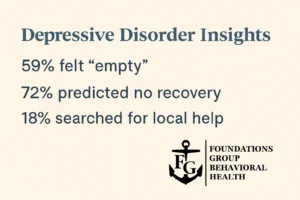I didn’t wake up one day wanting to die. It was more like slowly sinking underwater and realizing I didn’t have the strength to swim back up. I wasn’t looking for an ending—I was looking for relief. For quiet. For some way to stop feeling like every new day asked more of me than I had to give.
If you’re here reading this, you might know that feeling too—the strange in‑between place where you don’t want to die, but you don’t know how to keep living like this. That place is real, and it deserves care. For me, the first sign of change came from something I never thought I’d try: depressive disorder treatment in Massachusetts.
This is the story of how that treatment didn’t magically “fix” me, but slowly gave me the will to try again.
The Numbness Was the Loudest Part
Before anything felt painful, it felt empty. That’s the part people don’t talk about enough. Depression isn’t always crying on the bathroom floor or dramatic sleepless nights. Sometimes it’s brushing your teeth and realizing you can’t remember the last time you felt anything at all—good or bad.
Sometimes it’s staring at your phone, knowing you should respond, but the thought of typing one sentence feels like lifting a car.
Sometimes it’s sitting in the parking lot before work, hands on the wheel, hoping for a spark of motivation that just… never arrives.
I wasn’t in danger. But I wasn’t living. And that space between the two felt like quicksand.
Depression Didn’t Fit the Story I Had in My Head
I kept telling myself, I shouldn’t feel this way. I had a job. Friends. A roof over my head. I wasn’t supposed to struggle. I wasn’t supposed to feel like disappearing from my own life.
I told myself it would pass. That I was just burnt out. That taking a weekend off would magically reset everything.
It didn’t.
I didn’t know then that depression can hide inside routine. You can function on the outside while falling apart on the inside. You can laugh with friends and still feel hopeless the minute you’re alone. You can keep showing up—because you don’t know how not to—and still feel like you’re fading.
Depression doesn’t need a dramatic storyline. Sometimes it’s just the slow erosion of your ability to care.
The Day I Finally Reached Out Was Quiet
There’s no big cinematic moment here. One night I was sitting on my kitchen floor, not crying, not falling apart—just tired. So tired it felt like gravity had increased.
I didn’t want to die. I just wanted to stop feeling like living was too heavy.
Out of exhaustion more than bravery, I picked up my phone and searched for help. I didn’t type anything poetic or desperate. I literally typed:
“depression help Cape Cod”
Scrolling led me to something unexpected: Foundations Group Behavioral Health. And before I could talk myself out of it, I clicked.
If you’re in the same area, you might even be searching for something like:
- Depressive Disorder Treatment in Barnstable County, MA
- Depressive Disorder Treatment in Falmouth, MA
Seeing resources close to home made it feel less impossible. Like maybe help didn’t require becoming a different person or uprooting my life. Maybe it could start here, quietly, with one small step.
Walking Into Treatment Didn’t Feel Brave—It Felt Necessary
When I first walked in, I didn’t have a speech prepared. I didn’t even know how to explain what was happening inside me. I felt like I’d show up and someone would say, “You’re fine. Other people have it worse.”
But that’s not what happened.
The first thing I heard was:
“You’re here. That matters.”
No pressure to perform. No need to have the right words. They let me speak slowly. Or not speak at all. They didn’t rush me, and they didn’t treat me like a crisis that needed managing. They treated me like a person who had been surviving for too long without support.
It was the first time in a long time that someone looked at my numbness and said, “This deserves attention.”
The Early Days Were Small Changes—But They Counted
I’d love to say treatment instantly made me feel better. It didn’t. What it did was give me a tiny bit of space—like a window cracked open in a stuffy room.
The first small change?
I started noticing the difference between being tired and being overwhelmed. Before treatment, both felt like the same heavy fog. In therapy, I learned to name them. Once something had a name, it felt less like a monster and more like a message.
Another early shift:
I stopped pretending everything was okay. Not in a dramatic way—just quietly admitting to myself when I was struggling. And you’d be surprised how freeing that honesty can be.
Bit by bit, I felt like someone was handing me the tools to climb out of a very deep place.
Treatment Gave Me a Language for What I Was Feeling
One of the hardest parts of depression is not knowing how to articulate the heaviness. You feel like you’re supposed to explain your pain in a way that makes sense to other people.
Treatment gave me the words I didn’t have.
- “Numbness” is a symptom.
- “Hopelessness” is common.
- “Overwhelm” is human.
- And “not wanting to die, but not wanting to live like this” is something many people experience.
Hearing that didn’t fix anything—but it removed the shame. And when shame loosens its grip, healing gets a little easier.
Slowly, I Started Showing Up for Myself Again
As weeks passed, the smallest things began to feel possible again.
I returned a message.
I ate a real breakfast.
I opened the blinds before noon.
I went for a walk near the water in Falmouth and actually noticed the breeze.
None of these felt like miracles. But together, they were signs of something shifting. depression doesn’t lift like a curtain. It softens at the edges.
Treatment didn’t hand me my will to live. It helped me remember that I still had one buried underneath everything I’d been carrying.
Depressive Disorder Treatment Helped Me See That I Wasn’t Broken
What surprised me most was learning that depression isn’t a personality flaw or a failure of resilience. It’s a real condition that responds to real support—therapy, routine, structure, sometimes medication, sometimes new coping tools.
What I learned at Foundations Group Behavioral Health was that the goal wasn’t to “fix” me. It was to help me reconnect with myself. To gently pull me out of survival mode and into something more stable, more grounded, more possible.
And the thing I feared the most—that treatment would change me into someone I didn’t recognize—never happened.
Instead, I became someone I could finally recognize again.
Why Getting Help in Cape Cod Matters More Than You Think
There’s something grounding about getting help close to home. Cape Cod has this quiet stillness to it that makes healing feel possible. Whether you’re in Hyannis, Falmouth, or somewhere tucked along the coast, there’s something about having treatment nearby that makes the first step easier.
That matters. Because when you’re struggling with depression, convenience isn’t just a bonus—it’s part of what keeps the door open. Foundations Group Behavioral Health offers that kind of accessible, steady support right here in our community.
FAQs About Depressive Disorder Treatment in Cape Cod, MA
How do I know if what I’m feeling is depression?
You don’t need to hit a crisis point to seek help. If you’re feeling persistently numb, hopeless, exhausted, or overwhelmed—even if you’re still functioning—that’s enough. Depression can look like sadness, but it can also look like detachment, irritability, or emotional emptiness.
Do I need a referral to start treatment?
Most people don’t. You can usually reach out directly to a depressive disorder treatment program, ask questions, and schedule an initial appointment without needing a referral from another provider.
What happens in treatment?
Treatment usually includes a mix of therapy, emotional support, structure, skill-building, and sometimes medication management. It’s paced gently. You don’t need to know what to say or how to “start.” The team helps guide you through it.
What if I’m not in a crisis—am I still allowed to get help?
Absolutely. Many people who seek treatment aren’t in immediate danger. They’re just tired. Numb. Overwhelmed. Stuck. That is enough. You deserve care before things get worse, not after.
Can treatment really help if I’ve felt this way for a long time?
Yes. Depression can feel permanent, but it isn’t fixed. People who have struggled for months, years, or even most of their lives can still improve with the right support. Change doesn’t need to be dramatic to be real.
Your Next Step Doesn’t Have to Be Big
If all you can do today is read a blog like this, that’s enough. Truly. That’s a sign of wanting to stay. A sign of life pushing through the heaviness.
Whenever you’re ready—whether today, tomorrow, or next week—there’s a team here in Cape Cod ready to meet you gently, without pressure.
Call 888-685-9730 or visit the Foundations Group Behavioral Health depressive disorder treatment to learn more about Depressive Disorder Treatment services in Cape Cod, MA.









